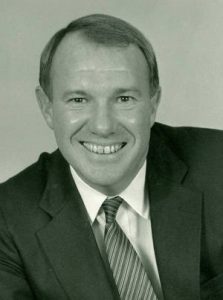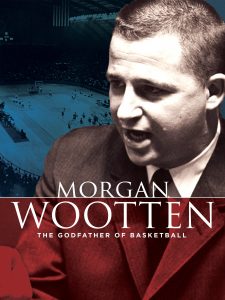It was very sad to hear the news this morning of last night’s passing of Hall of Fame basketball coach Morgan Wootten, considered one of the best coaches in the history of the sport. Coach Wootten spent 46 years as coach at DeMatha Catholic High School, where he won 5 national championships and 1200+ games en route to being inducted into the Naismith Hall of Fame in 2000. 1 of his former assistants was Terry Truax, who later won more than 200 games of his own after becoming head coach at Towson. HoopsHD’s Jon Teitel got to chat with Terry several years ago before he passed away in 2015 and is proud to present this never-before-published interview where he shared some very kind words about his former boss. We extend our condolences to the families of Terry/Morgan on their respective losses.
In the late 1960s you played for Bud Millikan at Maryland, where 1 of your teammates was future Terps coach Gary Williams: how good a player was Williams back in the day, and did you ever think he would go into coaching? In our day the PG position was diametrically opposite to now. He was not a scorer but he tried to make everyone better. He was tremendously intense and was a good leader who hated to lose. It did not surprise me that he went into coaching: he had played catcher for his high school baseball team and a lot of catchers make good managers. Some people think that he is aloof but he has a tremendous heart and is a good guy. I was a little surprised that he quit coaching when he did: I thought that he had 3-4 more years left in him. We had another teammate named Joe Harrington who also became a head coach.
After graduation you became JV coach at DeMatha High School, where you won 50 straight games led by future Hall of Famer Adrian Dantley (who later became your assistant at Towson): did it reach a point where you just expected to win every time you walked onto the court, and could you tell back then that Dantley was going to become a superstar? Adrian never played on the JV: he went right from 8th grade at the same high school that James Brown went to (James recommended him to us). When Adrian was in the 9th grade I told a reporter that he was an NBA prospect. We had 15 players on the roster because varsity coach Morgan Wootten wanted to give everyone an opportunity to play…and I had at least 5-6 guys who could dunk as 10th graders. We only had 1 close game during that time. I am a little embarrassed about the record. The 3 keys to success are coaching, recruiting, and scheduling. We were just trying to develop kids who could go on to make the varsity. We only had 250 kids at the school…and 80 of them tried out for the basketball team! Dantley’s decision came down to Notre Dame vs. Maryland after he decided not to go to UNC.
Take me through the magical 1971 NIT:
You were a grad assistant to Hall of Fame coach Dean Smith at UNC: what made him such a great coach, and what the most important thing that you ever learned from him? What made Wootten a great coach was his organization and how he managed his players. Coach Smith was very bright, not unlike Bob Knight: he was very into theology. He would remind the players that we are all equal in God’s eyes, whether you were a star like Charlie Scott or someone farther down the line. Everything is about family/loyalty/integrity. He liked to integrate different sports into basketball and kept everything in perspective. I was almost the same age as our players so he would occasionally send a zinger my way or give me “the look”.
In the semifinals George Karl scored 21 PTS in a 6-PT win over Duke (the only time the 2 schools have played each other in the postseason): was there a huge media frenzy leading up to the game, and how big a deal was it to beat your archrival? I remember that we beat UMass (featuring Julius Erving) in the 1st round and Providence (featuring Ernie DiGregorio) in the 2nd round. It was not the same magnitude that it is today with Roy and Coach K. I respect Coach K because he is intense and does not back down. I think that each team had a spy at Raleigh-Durham airport to keep track of which private planes were flying into town!
In the title game NIT MVP Bill Chamberlain scored a career-high 34 PTS to clinch the win over Georgia Tech: what did it mean to you to win the title, and what was the reaction like when you got back to campus? I do not remember that much about it but I was very happy for Chamberlain because he was 1 of the 1st African-American basketball players at UNC. Bill was a very intelligent young man who could have gone to Harvard. He gave me a better perspective on interracial relations.
You later became friends with legendary UCLA coach John Wooden: how did you 1st meet Coach Wooden, and what was he like off the court? It was very unique how I met him. In the summer of 1970 there was a publishing company who wanted Morgan to write a book and he said that if I co-authored it he would split the royalties with me. I wrote to Coach Wooden to get permission to use his “Pyramid of success” in the book and he said yes without demanding a penny. In September of 1974 I spent a week with him. His philosophy was that you get the respect that you earn. He used the example of some guys on his team whom he would love to date his daughter Nan even though they would rarely get to play for him. He shared everything with me: he was telling me which of his players did marijuana and were into transcendental meditation! 1 night Coach Wooden recommended that I go to a place called the Bat Rack where a lot of the pro athletes in LA hung out. When I dropped Coach Wooden’s name on the maitre’d he said, “What a shame that he lost to NC State last spring”. After that I stopped caring about the expectations that other people or the media put on me. The only thing I had in common with Coach Wooden was that we each had 203 losses! Kareem Abdul-Jabbar never had a scholarship: he got more money working part-time for MGM.
In the 1990 NCAA tourney as head coach at Towson, Kurk Lee scored 30 PTS in a 9-PT loss to Oklahoma: how close did you come to upsetting the #1-seed Sooners? Our preparation was good, particularly mentally. We had a tough non-conference schedule on the road that year (UNC, Syracuse, New Mexico, etc.) and playing such teams who were athletic/well-coached also helped prepare us. Oklahoma did not have a bunch of big men so we were not intimidated by their size and matched up pretty well with them. We were playing in Texas and all of the Longhorn fans started cheering for us after a call went against us in the 1st half. When I was writing the match-ups on the board in the locker room I did something corny: instead of writing my own player’s names I wrote “Buster” because Buster Douglas had just upset Mike Tyson 1 month earlier. We were down by 2 PTS with 90 seconds left and I called a timeout to draw up a play, but they called our big man for a moving screen.
What are your memories of the 1991 NCAA tourney (Jimmy Jackson scored 24 PTS in a win by #1-seed Ohio State)? We fell behind by a considerable margin but were able to make a run in the 2nd half. Everyone on the Buckeyes looked like a house with socks: they all spent time in the weight room. If you have good guard play then you will always have a chance. Coach Randy Ayers said that he had 6 starters so we practiced 6-on-5!
After retiring you conducted basketball camps during the summer: what made your camp different from other camps? I am not critical of other coaches’ camps but I try to emulate the UNC camps because they do a good job of teaching different skills at different stations. The kids just want to play games (which is what a lot of camps do) but I took a page out of Bob Knight’s book by teaching people HOW to play. 90% of the AAU programs do not focus on teaching, which I find annoying. We tried to give each kid a profile by telling them what their strengths/weaknesses are. I think it was appealing to the parents. I tried to keep the drills under 15 minutes before the kids stopped paying attention.
When people look back on your career, how do you want to be remembered the most? I hope they say that every kid I coached got better and most of our players were able to earn their degrees. I always loved what I did because coaching is based on relationships.




